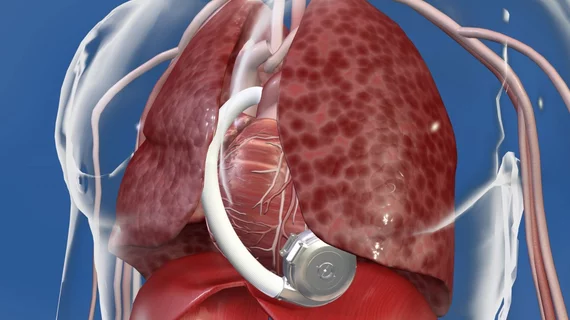Internal pump malfunction in the Medtronic HVAD found in three patients
The U.S. Food and Drug Administration (FDA) is alerting healthcare providers to the possibility that patients who have a Medtronic Heartware Ventricular Assist Device (HVAD) System and present with pump thrombosis may have a welding defect in the internal pump, causing it to malfunction. Medtronic and the FDA issues the notice to providers April 28 after three patients were identified with these issues and had their HVAD devices explanted.
The FDA said Medtronic received three complaints of patients with suspicion of pump thrombosis. Inspection of the returned HVAD units identified a malfunction of the internal pump. A pump exchange was performed for all three patients, and of these three patients, two patients died after the pump exchange.
Medtronic stopped manufacturing the HVAD system in June 2021 because of a series of problems with the HVAD left ventricular assist device (LVAD). The vendor said there was a growing body of clinical observations indicating a higher frequency of neurological adverse events, including stroke and mortality with the HVAD system as compared to other circulatory support devices available to patients. The company also initiated other recalls in the past for its LVAD.
While the FDA issued a letter in June 2021 asking providers to no longer implant HVAD system, many patients who have received the device implant continued on its therapy until today. The FDA did not recommend explanting these system because of the risk to patients.
Signs and symptoms of HVAD LVAD pump thrombosis
The three patients involved presented with one or more of the following signs or symptoms:
• Grinding sound
• Transient power spikes on the log files and High Watt alarms
• Elevated lactate dehydrogenase
• Low motor speed resulting in low perfusion
• Dizziness or lightheadedness
Medtronic issued an Urgent Medical Device Correction this week to inform healthcare providers of the pump weld defect. Medtronic is conducting an investigation to identify which HVAD pumps may be affected.
As stated in the FDA’s June 2021 communication after Medtronic announced the end of HVAD sales, the FDA said it does not recommend the elective removal of properly functioning systems. Decisions about removing or exchanging the Medtronic HVAD System should be made by healthcare providers and patients on a case-by-case basis, considering the patient’s clinical status and surgical risks.
Medtronic and FDA issued the following recommendations for HVAD patients:
• Patients who present with one or more of the signs or symptoms of pump thrombosis should be first treated for pump thrombosis.
• If symptoms do not resolve, only then consider whether the patient is a candidate for pump exchange, heart transplant or pump explant for recovery, considering the patient’s clinical condition and surgical risks.
• If patients have any of the signs and symptoms listed below, immediately submit all .csv logfiles from the controller as described in Medtronic’s Urgent Medical Device Correction.
The FDA said its commendations from the June 2021 communication have not changed. These include:
• Follow the instructions provided in the Instructions For Use (IFU) and adhere to current best clinical practices, including strict management of blood pressure and international normalized ratio (INR), and the use of system log files to support clinical decision-making related to pump performance.
• Discuss with patients that elective removal of an implanted Medtronic HVAD System is not recommended at this time. In general, the risks associated with explant outweigh the potential benefits.
• Report any adverse events or suspected events experienced with the Medtronic HVAD System through MedWatch, the FDA Safety Information and Adverse Event Reporting program.
The FDA said it will continue to work with Medtronic to monitor for any adverse events related to pump weld defects and ensure current patients with a Medtronic HVAD implant continue to receive appropriate follow-up monitoring. The FDA said it will keep healthcare providers and the public informed if new or additional information becomes available.
Read the full FDA letter to healthcare providers concerning the latest HVAD safety issues.
Congress investigating why it took so long to pull the HVAD off the market
The Medtronic HVAD system had several issues that resulted in multiple FDA recall notices the past several years. In March 2022, Congress, alarmed at the number of deaths caused by the HVAD, opened an investigation into how the FDA handled the 2021 recall of the device.
The FDA recall, finalized on June 3, came after ongoing issues that resulted in 14 deaths and 13 pump removals.
In an open letter to FDA Commissioner Robert Califf, MD, who has years of experience as a practicing cardiologist, Rep. Raja Krishnamoorthi said the recall “arrived too late for too many.”
Read the full article Congress investigating FDA over heart device recall, says agency ‘failed to protect consumers.’
Find more heart failure news

